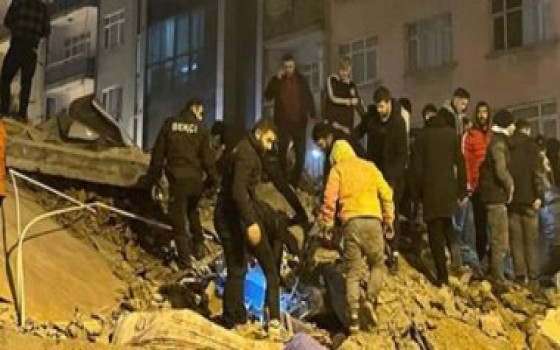
One year after the earthquake in Syria and Turkey...human suffering continues and reconstruction is very slow...disease outbreaks and social problems such as domestic violence and underage marriage

- Europe and Arabs
- Tuesday , 6 February 2024 15:49 PM GMT
Brussels - Capitals: Europe and the Arabs Enormous psychological and social problems, discrimination, an increase in domestic violence, teenage marriage... A year after the devastating earthquakes, Turkey and Syria are still licking their wounds. “We urgently need to enhance contributions in terms of international aid.” According to what was stated in a report published by the Belgian newspaper NewsBlad in Brussels on Tuesday, it added, “Exactly one year ago, two earthquakes that struck Turkey and Syria caused a massive humanitarian catastrophe: more than 100,000 buildings were turned into rubble, and tens of thousands of people lost their homes. They continued for weeks in Searching for survivors among the rubble. The final death toll is estimated at about 59,000 people, including 53,000 in Turkey and 6,000 in Syria. Incomprehensible human suffering from which the region has yet to recover, a year later. According to Doctors Without Borders, about one million people in Turkey still live in temporary camps. In Syria, where the war has been raging for twelve years, the situation seems more complicated. Currently, just over 2.5 million people are displaced in the northwest, a region where barely 4 million people live. The reconstruction process is proceeding slowly, and the need for humanitarian aid remains high. Various international relief organizations warn about this. Of particular concern is the lack of psychosocial assistance. “Mental health issues and massive trauma pose a risk of gender-based violence,” said Hakan Bilgin, head of Médecins du Monde in Turkey. “A year after the earthquakes, we noticed an increase in domestic and sexual violence, abuse, child labor and forced (teenage) marriage.” Cholera and lice MSF also stresses the need to prioritize mental health. Emmanuel Massart, MSF's Middle East coordinator, says the organization is focusing more on psychological assistance in refugee camps. “Our medical teams, including mental health professionals, visit refugee camps. They provide treatment, but they also take care of the living environment, which has a huge impact on mental health. There is no benefit in treating someone psychologically and then returning them to a broken tent, just as there is no benefit in treating someone for diarrhea without access to healthy drinking water. Massart's comparison is all the more important because access to basic needs such as food and water remains unclear for many people. Doctors of the World warns of health risks, especially for groups most at risk, such as children, the elderly, or people suffering from chronic diseases. A year later, the organization is still seeing regular outbreaks of infectious diseases such as scabies, lice and cholera. A report by a fundraising and aid organization, “11.11.11,” also points to another vulnerable group: Syrian refugees in Turkey. As a result of the war at home, nearly 4 million Syrians have crossed the Turkish border in recent years in search of safety. Of these, an estimated 1.7 million people were affected by the earthquakes. A giant group, according to a new 11.11.11 survey. . It appears that nearly 2 in 3 Syrian refugees in Turkey are currently not receiving enough emergency aid.












No Comments Found